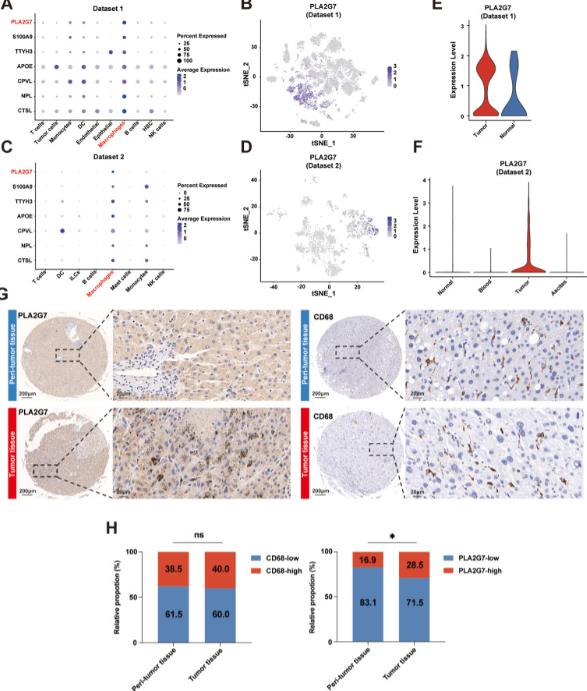Recently, a team led by Dong Ling from Zhongshan Hospital affiliated with Fudan University and Zhang Si from the School of Basic Medicine at Fudan University jointly published a new study in the Journal for ImmunoTherapy of Cancer, revealing the presence of a class of highly expressed platelet-activating factor acetylhydrolase (PLA2G7) and highly immunosuppressive TAMs in the microenvironment of hepatocellular carcinoma (HCC). Inhibiting PLA2G7 can improve the immune microenvironment and reinforce HCC immunotherapy.
Intervention of TAMs to enhance HCC immunotherapy has been a research focus in recent years, and their immunosuppressive “dominance” in the HCC microenvironment has long been notorious. But PLA2G7 has a bit of a crossover performance. Its previously focused functions were mainly in cardiovascular disease, energy metabolism, and other areas. In 2022, a heavyweight study published in Science revealed the impact of PLA2G7 on calorie restriction and longevity. Compared to this, there are not many cancer-related studies on PLA2G7.

Based on previous studies on HCC single-cell sequencing data, the Fudan team conducted a bioinformatics analysis specifically targeting TAMs in this study, identifying 34 genes that have significant differences in expression between TAMs in the HCC microenvironment and normal macrophages, and may be involved in TAMs mediated HCC immunosuppressive microenvironment. Combined with patient prognosis data, further screening and validation were conducted, reducing the number of target genes to 7, including PLA2G7.
Moreover, PLA2G7 is highly expressed only in macrophages (characterized by CD68+) within the HCC microenvironment, with moderate expression in other myeloid cells such as monocytes and dendritic cells, and rare in other immune cells. Therefore, researchers believe that it is more likely a key point in regulating TAMs; Data from the patient queue at Zhongshan Hospital also showed a significant correlation between high expression of PLA2G7 and shorter overall survival (OS) in HCC patients, with high expression of PLA2G7 and CD68 being more ominous.
In another cohort of HCC patients receiving PD-1 inhibitor treatment, the expression levels of tumor PLA2G7 and CD68 in patients who achieved partial remission (PR) were significantly lower than those in patients with disease progression (PD), and the expression levels of PLA2G7 and CD68 were also correlated with the degree of CD8+T cell infiltration, indicating that PLA2G7 in TAMs affects anti-tumor immunity.
Our Featured Products
| Cat. No. | Product Name | Source | Species | Tag |
| PLA2G7-1757H | Recombinant Human PLA2G7, His-tagged | E.coli | Human | His |
| PLA2G7-1145H | Active Recombinant Human PLA2G7 protein(Met1-Asn441), His-tagged | HEK293 | Human | C-His |
| PLA2G7-329H | Active Recombinant Human PLA2G7, His-tagged | E.coli | Human | His |
| PLA2G7-633H | Active Recombinant Human PLA2G7 Protein | HEK293 | Human | N/A |
| CD68-3253H | Recombinant Human CD68, Fc-His tagged | Human Cell | Human | Fc/His |
| Cd68-313M | Recombinant Mouse Cd68 protein, His-tagged | E.coli | Mouse | His |
| CD68-5679H | Active Recombinant Human CD68, HIgG1 Fc-tagged | CHO | Human | Fc |
| CD68-5678H | Active Recombinant Human CD68, MIgG2a Fc-tagged | CHO | Human | Fc |
| PDCD1-172H | Active Recombinant Human PDCD1, no tag | HEK293 | Human | N/A |
| PDCD1-031HAF488 | Active Recombinant Human PDCD1 Protein, MIgG2a mFc-tagged, Alexa Fluor 488 conjugated | CHO | Human | mFc |
| NFKB1-3973H | Recombinant Human NFKB1 protein, His-tagged | E.coli | Human | His |
The researchers turned around and reanalyzed the previous HCC single-cell sequencing data, grouping the PLA2G7 expression levels of macrophages in HCC patients into groups. They confirmed that high expression of PLA2G7 in tumor macrophages was significantly correlated with antigen presentation, lymphocyte chemotaxis, and weakened T cell activation. The expression of various pro-inflammatory/T cell activation genes was also significantly downregulated when macrophages overexpressed PLA2G7. These debuffs stacked together are obviously not conducive to immunotherapy.
Silencing the expression of PLA2G7 or using the small molecule inhibitor darapradib can to some extent polarize TAMs towards an M1 type that is beneficial for immunotherapy, and synergistically enhance the efficacy with PD-1 inhibitor therapy. Further experiments also showed that high expression of PLA2G7 would cause The activity of the NF-κB within TAMs signaling pathway significantly decreased, which may be the key to the high immunosuppressive effect of PLA2G7 on TAMs, but more detailed molecular mechanisms still need further research, and exploration.
Related Products and Services
Protein Expression and Purification Services
Reference
Zhang F, Liu W, Meng F, et al. Inhibiting PLA2G7 reverses the immunosuppressive function of intratumoral macrophages and augments immunotherapy response in hepatocellular carcinoma. J Immunother Cancer. 2024 Jan 25;12(1):e008094. doi: 10.1136/jitc-2023-008094. PMID: 38272562; PMCID: PMC10824072.